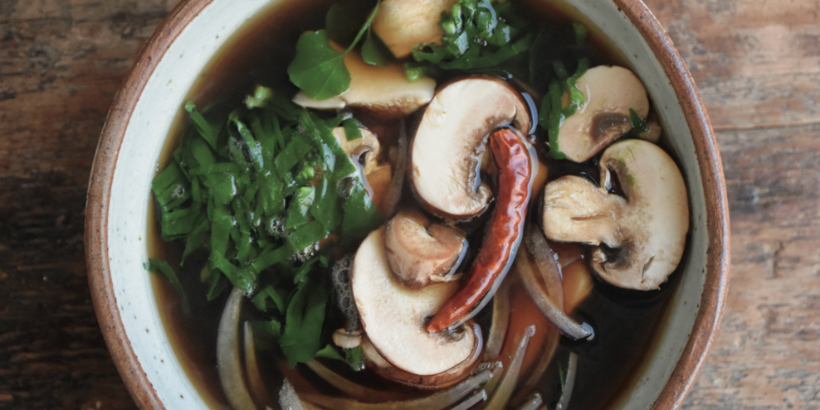Theres a fine line between a perfectly salted soup and one that tastes as saline as the ocean itself. The broth is better when properly seasoned, but a single extra dash of salt can take your meal overboard and make it difficult to enjoy. However, even if youve gone a little heavy-handed with the salt shaker, theres still a way to salvage that pot of brine — and you likely already have the secret ingredient in your pantry. Just a glug of vinegar can save the day and make your soup edible again.
Vinegar is high in acid, which is the key to balancing out a dish thats been oversalted. While adding vinegar wont reduce the amount of sodium in the pot, the sharp tang of this condiment can help equal out the salty flavor on your tastebuds, masking the brininess of an oversalted soup and making it easier to eat. Start with a small amount at first and add more slowly, tasting as you go, until your broth is back in balance.
It may sound a bit strange and unusual for some, but vinegar is a common ingredient in some soup recipes, and there is a good reason for it. If you think about it, vinegar is really a flavor-enhancer (umami). That’s why it is so often used in cooking, sauces, and salad dressings. The same is true with soups.

Which vinegars are best for neutralizing salty soup?
When it comes to selecting vinegar for salty soups, there are plenty of options. But not every variety will meld well into your broth, so be mindful and select a type that will provide acidity without overpowering the existing ingredients. For soups with a lighter base, choose a similarly light variety such as white wine vinegar, apple cider vinegar, or even rice wine vinegar (a popular ingredient in Chinese and Japanese soups). Classic white distilled vinegar can also work, but its quite sharp, so use it sparingly.
If your soup has more of a rich tomato or beef base, it may be able to stand up to the more intense flavors of stronger varieties. Red wine vinegar and balsamic vinegar, for example, can meld beautifully into beef soups and stews — and even provide a bit of extra depth of flavor to the broth. However, if you dont happen to have vinegar on hand, other acidic ingredients will work in a pinch as well. A squeeze of lemon or lime, or even some tomatoes can also add that touch of tartness that will help even out your soups seasonings.
Soup usually contains several ingredients and flavors, all competing to be the star of the show. Think of vinegar as the conductor of an orchestra. It can take a cacophony of flavors and sync them into perfect harmony. It both balances and awakens them. Plus, if you accidentally add too much salt to your soup, a little vinegar will tame the saltiness.
Every student was given the same ingredients to work with, yet when the class tasted each others soups, I could not believe how drastically different each was. (Mine was not even close to the best.) Getting one ingredient just right made certain soups stand out among the rest. What I learned that day was humbling and I never forgot the lesson: a small splash of acid, like vinegar, can be the difference between soup that tastes meh and really great soup you cant stop scooping into your mouth.
Tomato Soup: I used to think the only finishing touch my tomato soup needed was grilled cheese, but now I know the key to a fantastic tomato soup is a splash of aged balsamic vinegar. The sweetness will help neutralize the acidity of the tomatoes, while its tang will awaken their deep umami notes.
Intermittent Fasting Soup Recipe: Bone Broth + Apple Cider Vinegar
FAQ
What does vinegar do in soup?
Why do people add vinegar to bean soup?
Why add vinegar to chicken noodle soup?
What is the purpose of vinegar in cooking?
Is vinegar good for Soup?
Vinegar is also used to balance out the flavors, particularly in soups that are too sweet or rich. Furthermore, vinegar not only adds flavor to soups, but it also has numerous health benefits, including aiding digestion, lowering blood sugar levels, and reducing inflammation.
What are the benefits of drinking vinegar?
Drinking vinegar or apple vinegar has been said to reduce cancer risk, cure cancer as well as have anti-inflammatory, antimicrobial and antibacterial effects. In addition, vinegar is also said to help clear your skin and promote healthy hair growth. Unfortunately, to date, no clinical studies have been able to conclusively prove these benefits.
What happens if you add vinegar to soup?
When vinegar is added to soup, it can affect the taste, texture, and nutritional properties of the soup. Vinegar contains acetic acid, and when added to soup, it can help to balance its flavors and make the soup taste less sweet and cloying.
Should you add vinegar before cooking soup?
For instance, if you are cooking soup with beef or pork bones, add vinegar before boiling to soften the bones and extract their flavor. On the other hand, for vegetable soup, you may add vinegar towards the end of cooking to avoid breaking down the vegetables’ texture.
